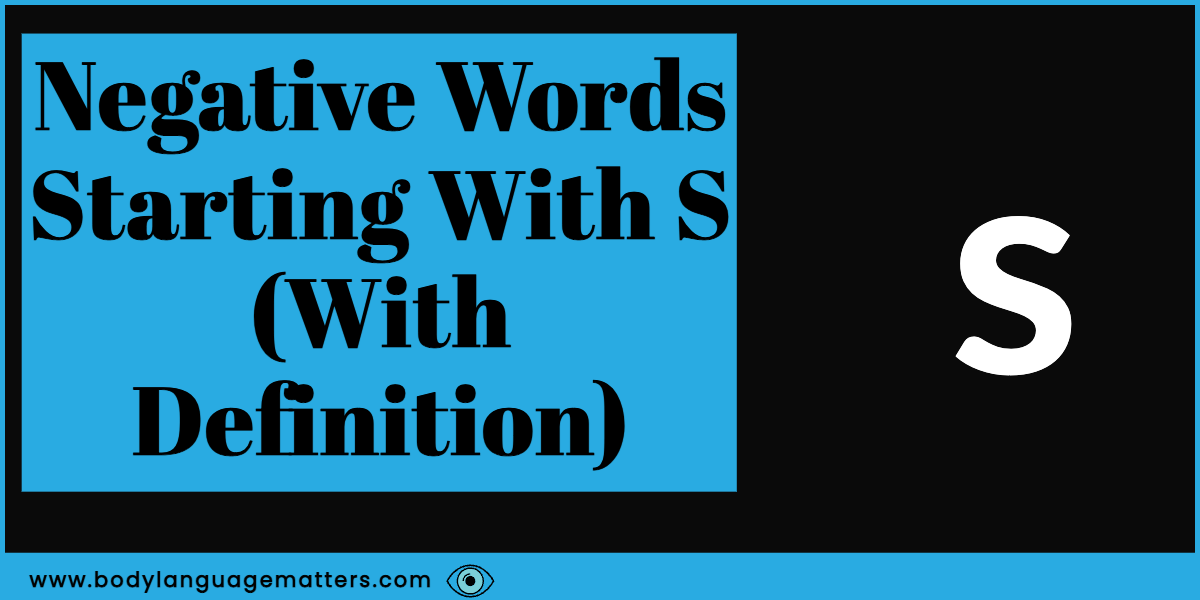Are you looking for the perfect negative word that starts with an S if this is the case we have you covered? We have listed over 100 with their descriptions so you can find the right word for the right occasion to sound brilliant.
Having a comprehensive list of negative words starting with “S” is essential as it helps people to communicate more efficiently and precisely. Negative language is used to express criticism, dissatisfaction, or disapproval, and to describe situations or emotions that evoke unpleasant feelings.
It is particularly useful in persuasive writing or marketing to stress liability, problematic outcomes, or drawbacks in a product or service.
Adding negative words can also be an effective communication tool for expressing empathy, acknowledging challenges or concerns, and showing understanding toward others.
However, the use of negative words should be done carefully, because overuse can make the language appear overly critical or pessimistic. Hence, it is essential not to exceed the boundary of negativity and be conscious of the tone and context in which these words are being used.
136 Negative Words Starting With The Letter S (List)
Sadness
feeling or showing sorrow; unhappy
Sorrow
a feeling of deep distress caused by loss, disappointment, or other misfortune
Suffering
experiencing pain or hardship
Shame
a painful feeling of humiliation or distress caused by the consciousness of wrong or foolish behavior
Sarcasm
the use of irony to mock or convey contempt
Scorn
a feeling of contempt for someone or something regarded as unworthy or inferior
Sluggish
slow-moving or inactive; lacking energy or enthusiasm
Stale
no longer fresh or pleasant to eat or smell
Stupidity
the quality or state of being foolish or unintelligent
Sterile
free from bacteria or other living organisms; lacking in interest or vitality
Sordid
involving immoral or unethical behavior; dirty or squalid
Sour
having an acidic or bitter taste; unpleasant or unfriendly
Skepticism
a skeptical attitude; doubt as to the truth of something
Solitude
the state of being alone or isolated
Strife
bitter conflict or struggle
Stigma
a mark of disgrace or shame; a negative association
Suppression
the act of suppressing or preventing something from being expressed or revealed
Sarcophagus
a stone coffin, typically adorned with a sculpture or inscription
Swindle
to cheat or defraud someone out of money or property
Subversion
the act of undermining or overthrowing a system or government
Sullen
bad-tempered and sulky; gloomy and dull
Slavery
the state of being owned and controlled by another person
Sabotage
to intentionally damage or undermine something, especially for political or military purposes
Slapdash
done hastily and carelessly; lacking attention to detail
Sinister
giving the impression that something harmful or evil is happening or will happen
Somber
dark and gloomy; serious and solemn
Spiteful
showing or caused by malice or ill will
Selfishness
the quality or state of being concerned only with one’s own interests and desires, often at the expense of others
Self-centered
excessively focused on oneself and one’s own interests or needs
Scowl
to have a facial expression of displeasure or anger
Sneer
to smile or speak in a contemptuous or mocking manner
Stereotype
a widely held but oversimplified and inaccurate image or idea of a particular group of people
Suspect
to believe or think that someone is guilty or up to no good
Sadistic
deriving pleasure from inflicting pain, suffering, or humiliation on others
Scrutiny
close examination or inspection
Secrecy
the state or quality of being secret or concealed
Senseless
lacking sense or meaning; foolish or pointless
Separation
the act of dividing or separating something or someone
Sickness
a state of physical or mental illness or disease
Stench
a strong and unpleasant smell
Strain
a state of tension or stress; a group of organisms within a species that have distinct characteristics
Stumble
to trip or lose one’s balance while walking or running
Stutter
to speak with involuntary pauses or repetitions
Submissive
obedient or willing to submit to the authority of others
Suspicion
a feeling or belief that something is true without having any proof
Stagnant
not moving or changing
Sin
an immoral or wicked act
Scam
a fraudulent or deceptive scheme
Stereotypical
conforming to a fixed or oversimplified image or idea of a particular group
Scapegoat
a person or group who is blamed for the mistakes or faults of others
Scream
a loud and piercing cry, often expressing fear or pain
Snobbery
the attitude or behavior of someone who believes they are superior to others
Slothful
lazy and lacking energy or motivation
Stifling
oppressive and suffocating, often in terms of heat or air quality
Supremacy
the state or condition of being superior or dominant over others
Surrender
to give up or yield to someone or something, often against one’s will
Smothering
suffocating or suppressing, often in terms of emotional or physical intensity
Sterilization
the process of making something free from bacteria or other living organisms
Suppress
to prevent or restrain something from being expressed or revealed
Squalor
a state of filth and degradation, often associated with poverty
Scathing
harshly critical or damaging
Sibilant
a hissing or whistling sound, often associated with disapproval or criticism
Soulless
lacking in emotion, feeling, or empathy
Squander
to waste or spend foolishly, often resulting in loss or ruin
Suppression
the act of forcibly stopping or preventing something from being expressed or revealed
Spurn
to reject or disdain someone or something with contempt
Slander
a false and damaging statement about someone, often intended to harm their reputation
Slight
to insult or disregard someone or something as unimportant or insignificant
Spite
a feeling of resentment or ill will, often resulting in harm or injury towards others
Sinful
characterized by or guilty of immoral or wicked behavior
Sensationalism
the use of exaggeration or sensational language to create interest or excitement, often at the expense of accuracy or truth
Sophistry
the use of false or deceptive arguments, often to justify or rationalize one’s beliefs or actions
Seclusion
the state of being isolated or removed from society or contact with others
Stalemate
a situation in which neither side can make progress or achieve victory
Scornful
expressing contempt or disdain towards someone or something
Sterile
lacking in interest or vitality; unproductive or uncreative
Somnolent
sleepy or drowsy, often in a way that inhibits alertness or productivity
Stereotype
a widely held but oversimplified and inaccurate image or idea of a particular group of people
Scapegoating
the act of unfairly blaming someone or something for the mistakes or faults of others
Self-doubt
a lack of confidence or belief in oneself, often leading to indecision or inaction
Self-destructive
causing harm or damage to oneself, often as a result of one’s own actions or behavior
Shallow
lacking depth or substance; superficial or trivial
Short-sighted
lacking foresight or vision; failing to consider long-term consequences
Sporadic
occurring irregularly or unpredictably, often resulting in inconsistency or uncertainty
Squabble
a minor or petty argument or dispute, often resulting in tension or conflict
Stigma
a mark symbol, or characteristic that is seen as a negative or shameful
Sabotage
to deliberately destroy or hinder something, often for personal gain or revenge
Sadistic
deriving pleasure from inflicting pain or suffering on others
Sagging
sinking or drooping in a way that suggests weakness or lack of support
Sanction
a penalty or punishment imposed for disobedience or violation of rules
Satirical
using irony or ridicule to expose or criticize human vices or follies
Scandalous
causing shock, outrage, or disgust due to immoral or improper behavior
Scorn
a feeling of contempt or disdain towards someone or something
Scourge
a cause of great suffering or punishment, often in the form of a plague or epidemic
Scrutiny
close examination or inspection, often resulting in criticism or suspicion
Secrecy
the state of being hidden or kept secret, often causing distrust or suspicion
Sedition
inciting rebellion or opposition against a government or authority
Seething
boiling with anger or intense emotion, often resulting in violent outbursts or behavior
Selfishness
a focus on one’s own needs and desires at the expense of others
Sensational
causing intense interest or excitement, often in a way that is excessive or exaggerated
Shabby
worn out, dilapidated, or lacking in quality or standards
Shattered
broken or destroyed, often in a way that causes great emotional or physical pain
Sheer
complete and utter, often in a way that suggests an overwhelming or impossible task or situation
Shocking
causing great surprise, horror, or disgust due to an unexpected or disturbing event or action
Shortfall
a deficiency or lack of something, often resulting in failure or disappointment
Shriek
a loud, high-pitched scream or cry, often expressing fear or pain
Shunned
rejected or ostracized by others, often due to differences in beliefs or behavior
Sickly
weak or unhealthy, often due to a lack of proper nutrition or care
Sigh
a deep, audible exhalation often expressing disappointment, frustration, or sadness
Silly
lacking in seriousness or importance, often resulting in foolish or trivial behavior
Sinister
evil or threatening in nature, often suggesting danger or harm
Skeptical
doubting or questioning the validity or truthfulness of something
Sluggish
slow or lacking energy or motivation, often resulting in inefficiency or delay
Smug
self-satisfied or complacent, often in a way that is annoying or irritating to others
Snarl
a deep, angry growl or noise, often expressing aggression or hostility
Sorrowful
full of sorrow or sadness, often resulting in tears or mourning
Spiteful
motivated by a desire to harm or hurt someone, often as a result of jealousy or resentment
Stagnant
not moving or changing, often resulting in a lack of progress or development
Stale
no longer fresh or interesting, often resulting in boredom or disinterest
Standoffish
unfriendly or distant in manner, often resulting in a lack of warmth or connection with others
Stark
severe or harsh in appearance or nature, often resulting in a feeling of bleakness or despair
Static
lacking movement or progress, often resulting in a lack of excitement or stimulation
Steep
difficult or challenging, often in terms of cost, effort, or
Stifling
suffocating or oppressive, often in a way that restricts freedom or creativity
Stressed
feeling overwhelmed or anxious, often due to excessive demands or pressure
Strife
conflict or struggle, often resulting in discord or tension
Struggle
to experience difficulty or hardship, often resulting in frustration or exhaustion
Stubborn
refusing to change one’s opinion or behavior, often resulting in conflict or impasse
Stupid
lacking intelligence or common sense, often resulting in foolish or unwise decisions
Submissive
obedient or compliant to an excessive or inappropriate degree, often resulting in exploitation or abuse
Sullen
sulky or bad-tempered, often resulting in a lack of enthusiasm or cooperation
Superficial
shallow or lacking depth, often in terms of thought or emotion
Suppressed
restrained or held back, often resulting in a lack of expression or authenticity
Suspicious
distrustful or wary of others, often resulting in paranoia or isolation
Sycophantic
excessively flattering or fawning, often in an insincere or manipulative manner
Sympathy
feeling sorry or pity for someone, often in a way that results in a lack of action or change.
Final Thoughts
There are plenty of negative adjectives/words that start with the letter S and a lot more. We have listed some of the most commonly used in the English language above to you can use them in your negative vocabulary. We hope you have found the right powerful word from the list above. Until next time thanks you for reading.

